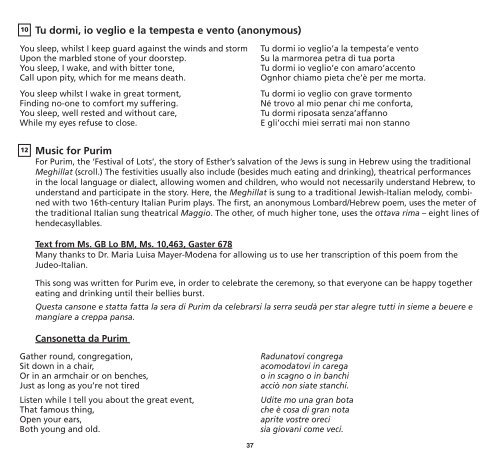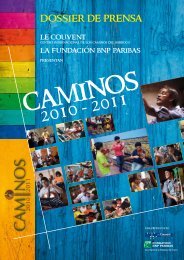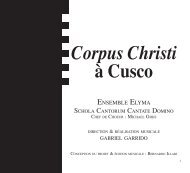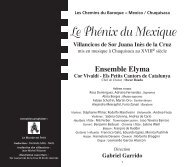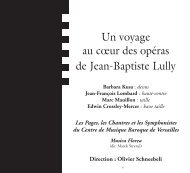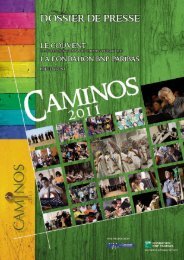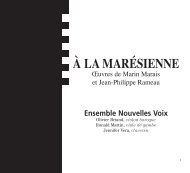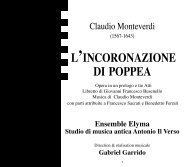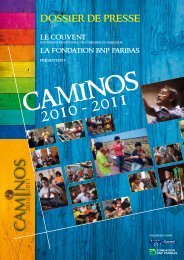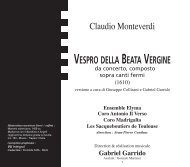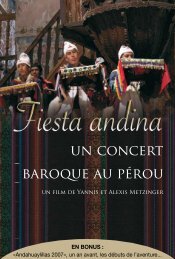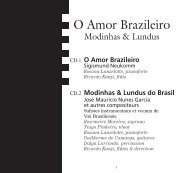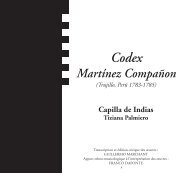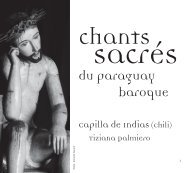Musique et poésie des Juifs en Italie à la Renaissance Music and ...
Musique et poésie des Juifs en Italie à la Renaissance Music and ...
Musique et poésie des Juifs en Italie à la Renaissance Music and ...
- No tags were found...
You also want an ePaper? Increase the reach of your titles
YUMPU automatically turns print PDFs into web optimized ePapers that Google loves.
10Tu dormi, io veglio e <strong>la</strong> tempesta e v<strong>en</strong>to (anonymous)You sleep, whilst I keep guard against the winds <strong>and</strong> stormUpon the marbled stone of your doorstep.You sleep, I wake, <strong>and</strong> with bitter tone,Call upon pity, which for me means death.You sleep whilst I wake in great torm<strong>en</strong>t,Finding no-one to comfort my suffering.You sleep, well rested <strong>and</strong> without care,While my eyes refuse to close.Tu dormi io veglio’a <strong>la</strong> tempesta’e v<strong>en</strong>toSu <strong>la</strong> marmorea p<strong>et</strong>ra di tua portaTu dormi io veglio’e con amaro’acc<strong>en</strong>toOgnhor chiamo pi<strong>et</strong>a che’è per me morta.Tu dormi io veglio con grave torm<strong>en</strong>toNé trovo al mio p<strong>en</strong>ar chi me conforta,Tu dormi riposata s<strong>en</strong>za’affannoE gli’occhi miei serrati mai non stanno12<strong>Music</strong> for PurimFor Purim, the ‘Festival of Lots’, the story of Esther’s salvation of the Jews is sung in Hebrew using the traditionalMeghil<strong>la</strong>t (scroll.) The festivities usually also include (besi<strong>des</strong> much eating <strong>and</strong> drinking), theatrical performancesin the local <strong>la</strong>nguage or dialect, allowing wom<strong>en</strong> <strong>and</strong> childr<strong>en</strong>, who would not necessarily underst<strong>and</strong> Hebrew, tounderst<strong>and</strong> <strong>and</strong> participate in the story. Here, the Meghil<strong>la</strong>t is sung to a traditional Jewish-Italian melody, combinedwith two 16th-c<strong>en</strong>tury Italian Purim p<strong>la</strong>ys. The first, an anonymous Lombard/Hebrew poem, uses the m<strong>et</strong>er ofthe traditional Italian sung theatrical Maggio. The other, of much higher tone, uses the ottava rima – eight lines ofh<strong>en</strong>decasyl<strong>la</strong>bles.Text from Ms. GB Lo BM, Ms. 10,463, Gaster 678Many thanks to Dr. Maria Luisa Mayer-Mod<strong>en</strong>a for allowing us to use her transcription of this poem from theJudeo-Italian.This song was writt<strong>en</strong> for Purim eve, in order to celebrate the ceremony, so that everyone can be happy tog<strong>et</strong>hereating <strong>and</strong> drinking until their bellies burst.Questa cansone e statta fatta <strong>la</strong> sera di Purim da celebrarsi <strong>la</strong> serra seudà per star alegre tutti in sieme a beuere emangiare a creppa pansa.Canson<strong>et</strong>ta da PurimGather round, congregation,Sit down in a chair,Or in an armchair or on b<strong>en</strong>ches,Just as long as you’re not tiredList<strong>en</strong> while I tell you about the great ev<strong>en</strong>t,That famous thing,Op<strong>en</strong> your ears,Both young <strong>and</strong> old.Radunatovi congregaacomodatovi in caregao in scagno o in banchiacciò non siate stanchi.Udite mo una gran botache è cosa di gran notaaprite vostre orecisia giovani come veci.37


